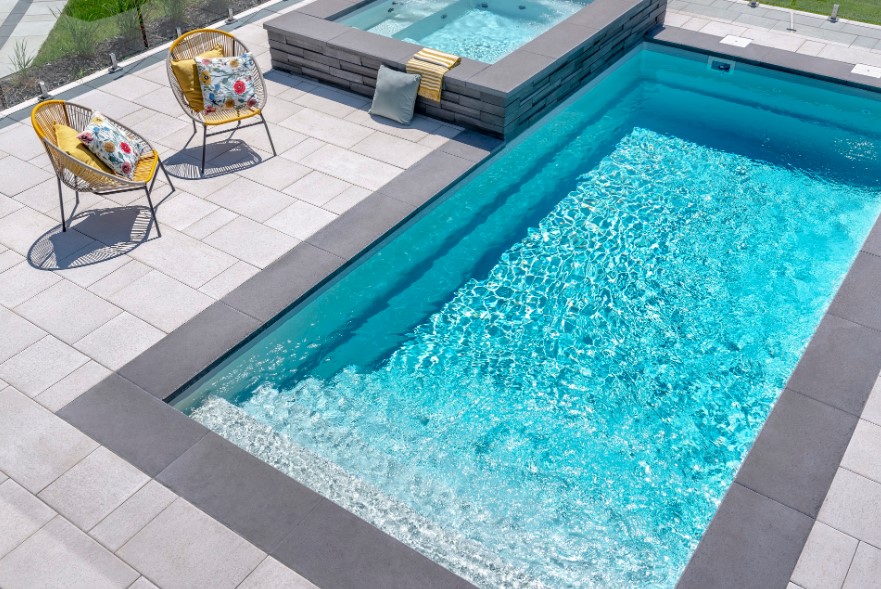
Fiberglass pools are among the fastest-growing pool types on the market. Not only do they cost less than concrete, but they also provide homeowners with an affordable option for installing a swimming pool. Here are five reasons why fiberglass pools are the choice for more and more homeowners.
Smooth Surface Finish
If you have decided to build a fiberglass pool, you have several choices for your finish. You can choose a traditional white plaster surface or a more modern option. It’s important to know what each one offers in terms of durability, appearance, and performance. The most obvious benefit of a smooth surface is that it helps prevent algae growth. In addition, it’s also easier to clean. And with a smooth finish, you won’t have to worry about scraping your feet or toes. While a smooth surface might seem like the best finish for your fiberglass pool, there are some potential issues that you should be aware of. These include chipping, erosion, particulate release, and cracking.
Faster Installation Than Concrete
Fiberglass pools offer several benefits, making them an ideal choice for many homeowners. While concrete pools may seem more impressive, fiberglass pools are easier to install and less expensive to run. They also offer a smooth gel coat finish that makes cleaning easier. The process of installing fiberglass pools St. Louis County, MO, is also relatively quick. You can have a pool in your yard within a few days. But the cost will vary depending on your zip code. Usually, you will pay anywhere from $23,000 to $36,000 to install a fiberglass pool. The biggest drawback to fiberglass pools is that they are less flexible than concrete pools. They may break easily. Also, fiberglass pools are not as durable as other types of pools.
Cheaper Upfront
There are a lot of factors to consider when building a pool. The material price, labor, and installation are all important factors to consider. Adding on other features can add to the project. Pools come in different shapes and sizes. Some fiberglass pools are suited for small yards, while others are better for larger spaces. If you plan to install a custom pool, you can choose the shape, style, and size that best fits your needs. Fiberglass pools are more durable than vinyl-lined ones. They are also easier to clean and maintain. In addition, they do not require freeze/thaw cycles. This makes them much less expensive to maintain than concrete or vinyl pools.
Water Chemistry Is Easier To Manage.
One of the biggest advantages of having a fiberglass pool is that it is easier to manage your pool’s water chemistry. This means you don’t have to spend as much time and money on maintenance and balancing. However, it’s still important to keep up with water chemistry. For example, you should check your total alkalinity regularly. If it’s too high, your pool will become cloudy. You should also make sure your pH is in the right range. The ideal pH level for your pool is between 7.4 and 7.6. A balance between these factors will keep your pool’s water clear, comfortable, and healthy. It will also reduce the chances of skin and eye irritation.
No Need To Acid Wash
If you have a fiberglass pool, you might wonder whether it is necessary to acid wash it. Acid washing will remove a thin layer of plaster from the pool’s surface. It also eliminates algae spores that could cause your pool to be a breeding ground for mold. It is a good idea to acid wash your pool every few years. This can help keep a fresh appearance and prevent existing algae from mixing with your new finish. The process should be done in steps and an organized manner. Steel algae brush is essential to the job. When you’re done, you should test the pH of your water.
Flexible Options For Resurfacing And Design
If you have an in-ground pool and are considering resurfacing, several flexible options exist. You can install a beautiful, durable, long-lasting fiberglass pool or a new vinyl liner. Both of these options can add value to your property. However, a fiberglass pool is easier to install. It is also easier to maintain and can be a great alternative to a concrete pool. Concrete pools are often expensive upfront. This is mainly because of their need for frequent maintenance and repair. Typically, a concrete pool must resurface every 10-15 years. Depending on the type of material used, the cost can vary greatly.